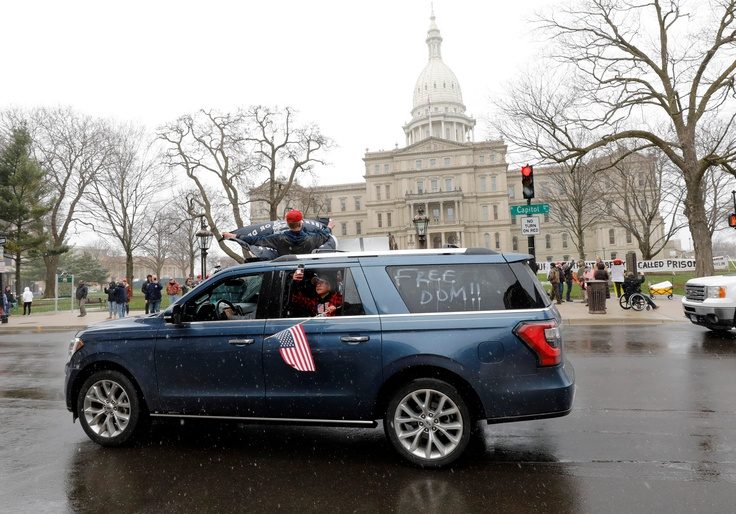Thousands of Michigan residents descended on the statehouse in Lansing on Wednesday to protest Democratic governor Gretchen Whitmer's stay-at-home order, with critics citing draconian restrictions that hurt small businesses and do little to fight the spread of coronavirus.
The protest, labeled "Operation Gridlock," saw swarms of cars, trucks, construction vehicles, and even horses assemble in downtown Lansing as early as 9:00 a.m. The honking did not stop for another eight hours. Rosanne Ponkowski, president of Michigan Conservative Coalition and one of the protest's organizers, called the turnout "incredible." She said state police estimated as many as 10,000 participants, despite the event's spontaneous launch on Facebook on April 8.
"It was incredible for something we cooked up just a week ago. I was so proud of how fast this event grew," Ponkowski told the Washington Free Beacon. "We just threw this together last Wednesday, thinking, 'We have to do something.' Within four hours, we had 300 people say they were attending and 2,000 people 'like' the event. It just exploded from there."
Whitmer had earned bipartisan praise for her initial response to the pandemic—her first stay-at-home order issued March 23 was met with approval from state GOP leaders and earned the governor national praise, particularly as the Democrat entered a public feud with President Donald Trump. As Whitmer's profile rose, she ramped up restrictions, signing a new order on April 9 that banned in-state travel between residences and forcibly closed stores selling items she deemed "nonessential."
The extended order sparked near-immediate fury. Critics lamented the strain it put on struggling small businesses while granting exemptions to large corporations. Residents have also questioned the practical inconsistencies of what are considered "essential services"—the order, for example, bans landscaping services and shuts down local stores selling gardening seeds and paint, but allows for the sale of marijuana and lottery tickets.
"There doesn't seem to be any rhyme or reason to how [Whitmer] makes her decisions. She needs to stop deciding for Michiganders what is an essential service and what is not," Ponkowski said. "Landscapers, home builders—these people social distance by the nature of their work and they're outdoors. These people should go back to work."
Ponkowski's message was mirrored Wednesday by thousands of Michiganders. One protester, Kaleb Hunderman of Grand Rapids, told Traverse City-based UpNorthLive that he decided to join the protest after losing his job.
"We're just mad that we're out of work and … we don't like what she did," Hunderman said. "So, we wanted to come down here and protest it."
Whitmer, whose office did not respond to a request for comment, criticized the protest in a Wednesday press conference held before the honking had subsided. The governor said that while she "understands the frustration people are feeling," she was "really disappointed to see people congregating and not wearing masks." The protest's organizers instructed participants to remain in their vehicles, but state police Lt. Darren Green estimated that 100 to 150 people left their cars to gather on the capitol lawn. Much of the group did not adhere to social distancing requirements and most were not wearing masks.
Tony Daunt, executive director of Operation Gridlock sponsor Michigan Freedom Fund, called the group "bad actors."
"Obviously, there's always going to be the unfortunate few who don't follow the instruction to remain in their vehicle," Daunt told the Free Beacon. "That's unfortunate, but sometimes freedom and liberty can be messy and despite the best intentions of the event's organizers, there's always going to be some who think they know better."
Critics of Operation Gridlock also accused protesters of blocking emergency vehicles attempting to navigate the packed Lansing streets. Gongwer News Service Michigan executive editor Zach Gorchow shared a photo of an ambulance impeded by traffic just before the protest's official start time. Public health officials downplayed the protest's effect on services. A spokesman for the hospital located near the capitol told Crain's Detroit Business's Chad Livengood that the protest was not blocking the flow of ambulances in and out of the hospital, and Lansing mayor Andy Schor, a Democrat, told Detroit News's Craig Mauger that he had not heard of complaints from Lansing first responders about emergency vehicles being blocked. The city's public transportation authority, however, released a statement Wednesday afternoon saying its dial-a-ride bus service was "temporarily disrupted" due to the protest.
State House speaker Lee Chatfield briefly joined the protest Wednesday afternoon, telling Sinclair Broadcast Group's Mikenzie Frost that he is working with Whitmer to ease some of the order's restrictions. Daunt expressed hope that the protest would help move the needle.
"Thousands of Michigan residents took time from their day, made signs, traveled to Lansing, and peacefully expressed their opinions to the governor," Daunt said. "Hopefully it shines a light on people's angst in this state and their concern over their jobs, and we'll see how [Whitmer] reacts."
